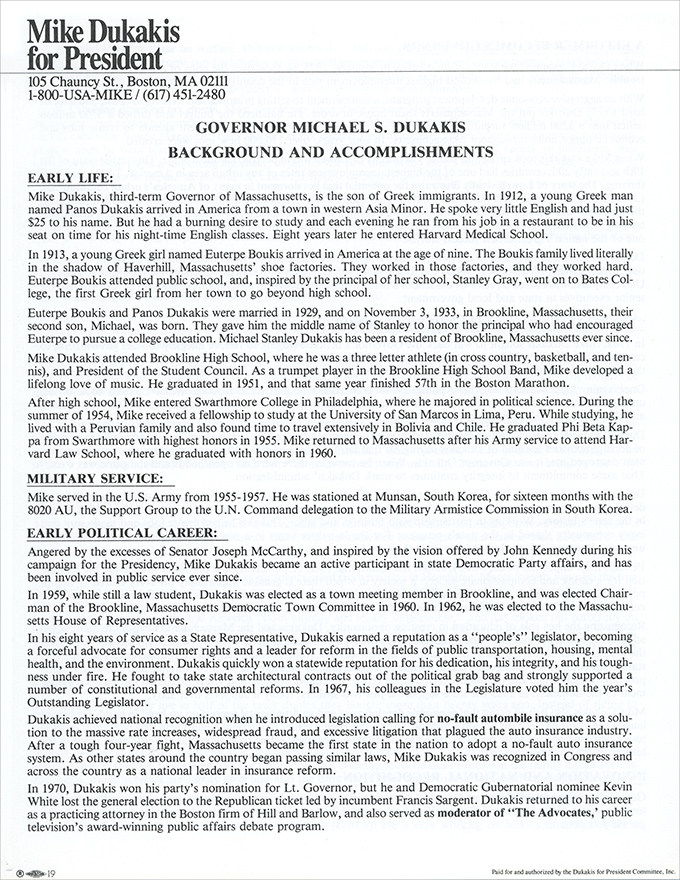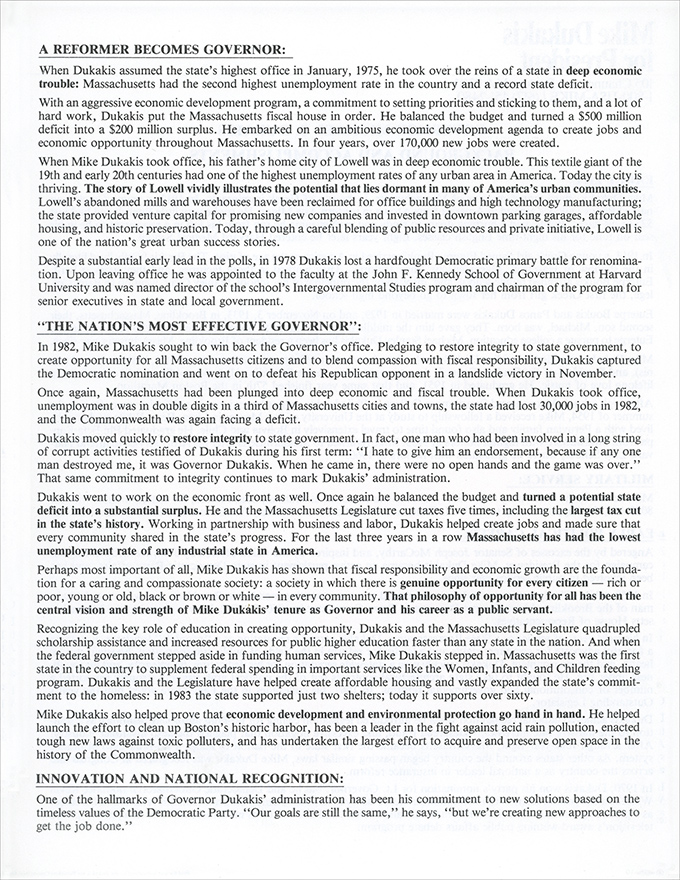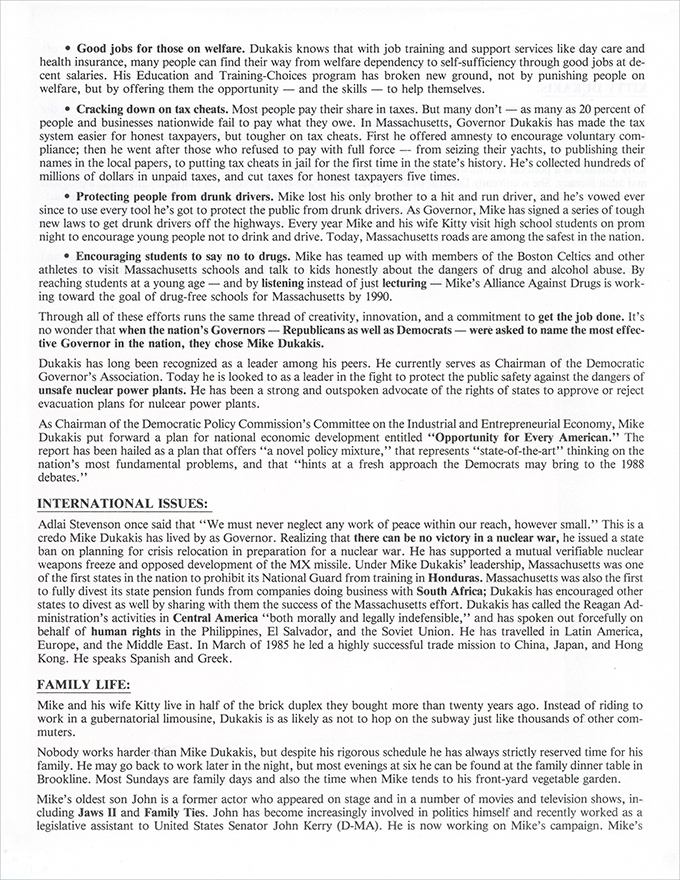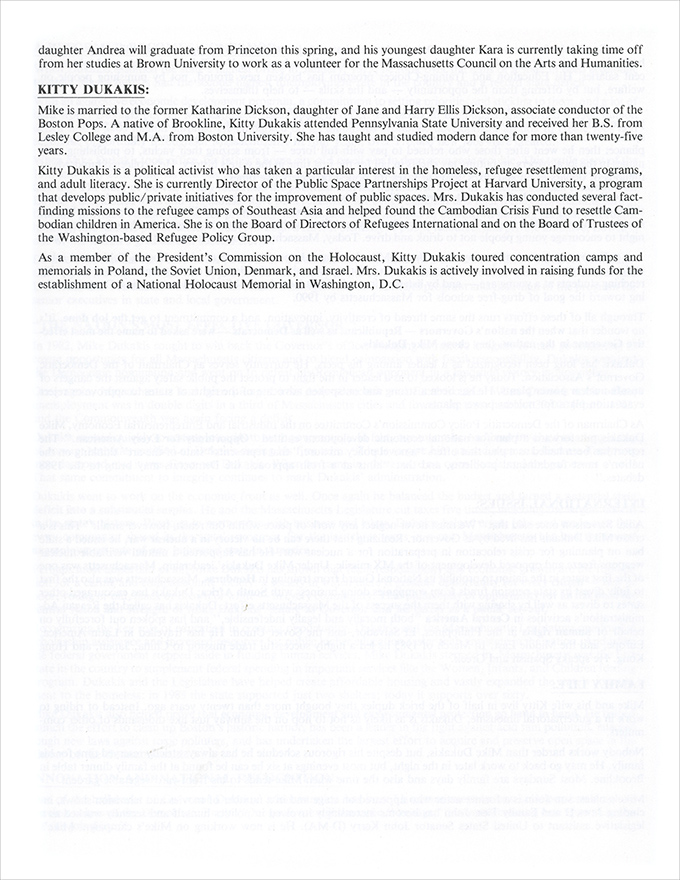- Campaign
Literature « 1988
Democratic Presidential Primary «
Dukakis for President Committee
1988 Democratic Presidential Primary
Dukakis for President Committee

|
|
|
|
| Bio/Accomplishments (4 pages) |
GOVERNOR MICHAEL S. DUKAKIS
BACKGROUND AND ACCOMPLISHMENTS
EARLY LIFE:
Mike Dukakis, third-term Governor of Massachusetts, is the son of Greek immigrants. In 1912, a young Greek man named Panos Dukakis arrived in America from a town in western Asia Minor. He spoke very little English and had just $25 to his name. But he had a burning desire to study and each evening he ran from his job in a restaurant to be in his seat on time for his night-time English classes. Eight years later he entered Harvard Medical School.
In 1913, a young Greek girl named Euterpe Boukis arrived in America at the age of nine. The Boukis family lived literally in the shadow of Haverhill, Massachusetts' shoe factories. They worked in those factories, and they worked hard. Euterpe Boukis attended public school, and, inspired by the principal of her school, Stanley Gray, went on to Bates College, the first Greek girl from her town to go beyond high school.
Euterpe Boukis and Panos Dukakis were married in 1929, and on November 3, 1933, in Brookline, Massachusetts, their second son, Michael, was born. They gave him the middle name of Stanley to honor the principal who had encouraged Euterpe to pursue a college education. Michael Stanley Dukakis has been a resident of Brookline, Massachusetts ever since.
Mike Dukakis attended Brookline High School, where he was a three letter athlete (in cross country, basketball, and tennis), and President of the Student Council. As a trumpet player in the Brookline High School Band, Mike developed a lifelong love of music. He graduated in 1951, and that same year finished 57th in the Boston Marathon.
After high school, Mike entered Swarthmore College in Philadelphia, where he majored in political science. During the summer of 1954, Mike received a fellowship to study at the University of San Marcos in Lima, Peru. While studying, he lived with a Peruvian family and also found time to travel extensively in Bolivia and Chile. He graduated Phi Beta Kappa from Swarthmore with highest honors in 1955. Mike retumed to Massachusetts after his Army service to attend Harvard Law School, where he graduated with honors in 1960.
MILITARY SERVICE:
Mike served in the U.S. Army from 1955-1957. He was stationed at Munsan, South Korea, for sixteen months with the 8020 AU, the Support Group to the U.N. Command delegation to the Military Armistice Commission in South Korea.
EARLY POLITICAL CAREER:
Angered by the excesses of Senator Joseph McCarthy, and inspired by the vision off ered by John Kennedy during his campaign for the Presidency, Mike Dukakis became an active participant in state Democratic Party affairs, and has been involved in public service ever since.
In 1959, while still a law student, Dukakis was elected as a town meeting member in Brookline, and was elected Chairman of the Brookline, Massachusetts Democratic Town Committee in 1960. In 1962, he was elected to the Massachusetts House of Representatives.
In his eight years of service as a State Representative, Dukakis earned a reputation as a "people's" legislator, becoming a forceful advocate for consumer rights and a leader for reform in the fields of public transportation, housing, mental health, and the environment. Dukakis quickly won a statewide reputation for his dedication, his integrity, and his toughness under fire. He fought to take state architectural contracts out of the political grab bag and strongly supported a number of constitutional and governmental reforms. In 1967, his colleagues in the Legislature voted him the year's Outstanding Legislator.
Dukakis achieved national recognition when he introduced legislation calling for no-fault automobile insurance as a solution to the massive rate increases, widespread fraud, and excessive litigation that plagued the auto insurance industry. After a tough four-year fight, Massachusetts became the first state in the nation to adopt a no-fault auto insurance system. As other states around the country began passing similar laws, Mike Dukakis was recognized in Congress and across the country as a national leader in insurance reform.
In 1970, Dukakis won his party's nomination for Lt. Governor, but he and Democratic Gubernatorial nominee Kevin White lost the general election to the Republican ticket led by incumbent Francis Sargent. Dukakis returned to his career as a practicing attorney in the Boston firm of Hill and Barlow, and also served as moderator of "The Advocates," public television's award-winning public affairs debate program.
A REFORMER BECOMES GOVERNOR:
When Dukakis assumed the state's highest office in January, 1975, he took over the reins of a state in deep economic trouble: Massachusetts had the second highest unemployment rate in the country and a record state deficit.
With an aggressive economic development program, a commitment to setting priorities and sticking to them, and a lot of hard work, Dukakis put the Massachusetts fiscal house in order. He balanced the budget and turned a $500 million deficit into a $200 million surplus. He embarked on an ambitious economic development agenda to create jobs and economic opportunity throughout Massachusetts. In four years, over 170,000 new jobs were created.
When Mike Dukakis took office, his father's home city of Lowell was in deep economic trouble. This textile giant of the 19th and early 20th centuries had one of the highest unemployment rates of any urban area in America. Today the city is thriving. The story of Lowell vividly illustrates the potential that lies dormant in many of America's urban communities. Lowell's abandoned mills and warehouses have been reclaimed for office buildings and high technology manufacturing; the state provided venture capital for promising new companies and invested in downtown parking garages, affordable housing, and historic preservation. Today, through a careful blending of public resources and private initiative, Lowell is one of the nation's great urban success stories.
Despite a substantial early lead in the polls, in 1978 Dukakis lost a hard-fought Democratic primary battle for renomination. Upon leaving office he was appointed to the faculty at the John F. Kennedy School of Government at Harvard University and was named director of the school's Intergovernmental Studies program and chairman of the program for senior executives in state and local government.
"THE NATION'S MOST EFFECTIVE GOVERNOR":
In 1982, Mike Dukakis sought to win back the Governor's office. Pledging to restore integrity to state government, to create opportunity for all Massachusetts citizens and to blend compassion with fiscal responsibility, Dukakis captured the Democratic nomination and went on to defeat his Republican opponent in a landslide victory in November.
Once again, Massachusetts had been plunged into deep economic and fiscal trouble. When Dukakis took office, unemployment was in double digits in a third of Massachusetts cities and towns, the state had lost 30,000 jobs in 1982, and the Commonwealth was again facing a deficit.
Dukakis moved quickly to restore integrity to state government. In fact, one man who had been involved in a long string of corrupt activities testified of Dukakis during his first term: "I hate to give him an endorsement, because if any one man destroyed me, it was Governor Dukakis. When he came in, there were no open hands and the game was over." That same commitment to integrity continues to mark Dukakis' administration.
Dukakis went to work on the economic front as well. Once again he balanced the budget and turned a potential state deficit into a substantial surplus. He and the Massachusetts Legislature cut taxes five times, including the largest tax cut in the state's history. Working in partnership with business and labor, Dukakis helped create jobs and made sure that every community shared in the state's progress. For the last three years in a row Massachusetts has had the lowest unemployment rate of any industrial state in America.
Perhaps most important of all, Mike Dukakis has shown that fiscal responsibility and economic growth are the foundation for a caring and compassionate society: a society in which there is genuine opportunity for every citizen – rich or poor, young or old, black or brown or white – in every community. That philosophy of opportunity for all has been the central vision and strength of Mike Dukakis' tenure as Governor and bis career as a public servant.
Recognizing the key role of education in creating opportunity, Dukakis and the Massachusetts Legislature quadrupled scholarship assistance and increased resources for public higher education faster than any state in the nation. And when the federal government stepped aside in funding human services, Mike Dukakis stepped in. Massachusetts was the first state in the country to supplement federal spending in important services like the Women, Infants, and Children feeding program. Dukakis and the Legislature have helped create affordable housing and vastly expanded the state's commitment to the homeless: in 1983 the state supported just two shelters; today it supports over sixty.
Mike Dukakis also helped prove that economic development and environmental protection go hand in hand. He helped launch the effort to clean up Boston's historic harbor, has been a leader in the fight against acid rain pollution, enacted tough new laws against toxic polluters, and has undertaken the largest effort to acquire and preserve open space in the history of the Commonwealth.
INNOVATION AND NATIONAL RECOGNITION:
One of the hallmarks of Governor Dukakis' administration has been his commitment to new solutions based on the timeless values of the Democratic Party. "Our goals are still the same," he says, "but we're creating new approaches to get the job done."
- Good jobs for those on welfare. Dukakis knows that with job training and support services like day care and health insurance, many people can find their way from welfare dependency to self-sufficiency through good jobs at decent salaries. His Education and Training-Choices program has broken new ground, not by punishing people on welfare, but by offering them the opportunity – and the skills – to help themselves.
- Cracking down on tax cheats. Most people pay their share in taxes. But many don't – as many as 20 percent of people and businesses nationwide fail to pay what they owe. In Massachusetts, Governor Dukakis has made the tax system easier for honest taxpayers, but tougher on tax cheats. First he offered amnesty to encourage voluntary compliance; then he went after those who refused to pay with full force – from seizing their yachts, to publishing their names in the local papers, to putting tax cheats in jail for the first time in the state's history. He's collected hundreds of millions of dollars in unpaid taxes, and cut taxes for honest taxpayers five times.
- Protecting people from drunk drivers. Mike lost his only brother to a hit and run driver, and he's vowed ever since to use every tool he's got to protect the public from drunk drivers. As Governor, Mike has signed a series of tough new laws to get drunk drivers off the highways. Every year Mike and his wife Kitty visit high school students on prom night to encourage young people not to drink and drive. Today, Massachusetts roads are among the safest in the nation.
- Encouraging students to say no to drugs. Mike has teamed up with members of the Boston Celtics and other athletes to visit Massachusetts schools and talk to kids honestly about the dangers of drug and alcohol abuse. By reaching students at a young age – and by listening instead of just lecturing – Mike's Alliance Against Drugs is working toward the goal of drug-free schools for Massachusetts by 1990.
Dukakis has long been recognized as a leader among his peers. He currently serves as Chairman of the Democratic Governor's Association. Today he is looked to as a leader in the fight to protect the public safety against the dangers of unsafe nuclear power plants. He has been a strong and outspoken advocate of the rights of states to approve or reject evacuation plans for nuclear power plants.
As Chairman of the Democratic Policy Commission's Committee on the Industrial and Entrepreneurial Economy, Mike Dukakis put forward a plan for national economic development entitled "Opportunity for Every American." The report has been hailed as a plan that offers "a novel policy mixture," that represents "state-of-the-art" thinking on the nation's most fundamental problems, and that "hints at a fresh approach the Democrats may bring to the 1988 debates."
INTERNATIONAL ISSUES:
Adlai Stevenson once said that "We must never neglect any work of peace within our reach, however small." This is a credo Mike Dukakis has lived by as Governor. Realizing that there can be no victory in a nuclear war, he issued a state ban on planning for crisis relocation in preparation for a nuclear war. He has supported a mutual verifiable nuclear weapons freeze and opposed development of the MX missile. Under Mike Dukakis' leadership, Massachusetts was one of the first states in the nation to prohibit its National Guard from training in Honduras. Massachusetts was also the first to fully divest its state pension funds from companies doing business with South Africa; Dukakis has encouraged other states to divest as well by sharing with them the success of the Massachusetts effort. Dukakis has called the Reagan Administration's activities in Central America "both morally and legally indefensible," and has spoken out forcefully on behalf of human rights in the Philippines, El Salvador, and the Soviet Union. He has travelled in Latin America, Europe, and the Middle East. In March of 1985 he led a highly successful trade mission to China, Japan, and Hong Kong. He speaks Spanish and Greek.
FAMILY LIFE:
Mike and his wife Kitty live in half of the brick duplex they bought more than twenty years ago. Instead of riding to work in a gubernatorial limousine, Dukakis is as likely as not to hop on the subway just like thousands of other commuters.
Nobody works harder than Mike Dukakis, but despite his rigorous schedule he has always strictly reserved time for his family. He may go back to work later in the night, but most evenings at six he can be found at the family dinner table in Brookline. Most Sundays are family days and also the time when Mike tends to his front-yard vegetable garden.
Mike's oldest son John is a former actor who appeared on stage and in a number of movies and television shows, including Jaws II and Family Ties. John has become increasingly involved in politics himself and recently worked as a legislative assistant to United States Senator John Kerry (D-MA). He is now working on Mike's campaign. Mike's daughter Andrea will graduate from Princeton this spring, and his youngest daughter Kara is currently taking time off from her studies at Brown University to work as a volunteer for the Massachusetts Council on the Arts and Humanities.
KITTY DUKAKIS:
Mike is married to the former Katharine Dickson, daughter of Jane and Harry Ellis Dickson, associate conductor of the Boston Pops. A native of Brookline, Kitty Dukakis attended Pennsylvania State University and received her B.S. from Lesley College and M.A. from Boston University. She has taught and studied modern dance for more than twenty-five years.
Kitty Dukakis is a political activist who has taken a particular interest in the homeless, refugee resettlement programs, and adult literacy. She is currently Director of the Public Space Partnerships Project at Harvard University, a program that develops public/private initiatives for the improvement of public spaces. Mrs. Dukakis has conducted several fact-finding missions to the refugee camps of Southeast Asia and helped found the Cambodian Crisis Fund to resettle Cambodian children in America. She is on the Board of Directors of Refugees International and on the Board of Trustees of the Washington-based Refugee Policy Group.
As a member of the President's Commission on the Holocaust, Kitty Dukakis toured concentration camps and memorials in Poland, the Soviet Union, Denmark, and Israel. Mrs. Dukakis is actively involved in raising funds for the establishment of a National Holocaust Memorial in Washington, D.C.
[union bug] Paid for and authorized by the Dukakis for President Committee. lnc.
 |
 |
 |

